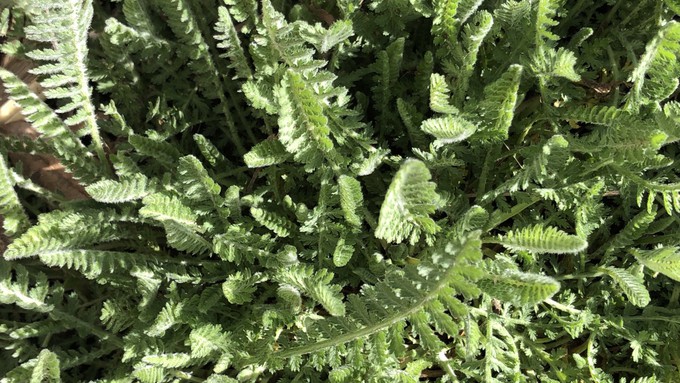
Online sale of California natives begins Saturday

Common yarrow is a reliably hardy green perennial in winter, but will show off with white flowering stalks as the weather warms up Kathy Morrison
March brings a rush of spring plant sales. Kicking off the season is the Sacramento Valley Chapter of the California Native Plant Society with a four-day online sale this Saturday through midday Wednesday, March 4-8.
SacValley CNPS has a propagation nursery and demonstration gardens on property at Soil Born Farms, 2140 Chase Drive, Rancho Cordova, though it is a separate entity from Soil Born. Formerly called Elderberry Farms, the nursery’s name now is SacValley CNPS Nursery and Gardens, in order to focus better on the chapter’s activities.
If you want a garden filled with natives – and why wouldn’t you? – this is one of the best sales in the Sacramento area at which to find them. The 61 plants on the inventory list range from Achillea millefolium (yarrow) to Vitus californica (California wild grape), and many other great plants in between. Check out the inventory here. Shopping tip: Create a wishlist ahead of time, then when the sale starts, just indicate the size of plant desired. Attributes of each plant are in this detailed list. Most will be in 1-gallon pots ($13), with some in 4-inch pots ($6).
The sale also will feature about 20 books and pocket manuals on native plants and/or wildlife, including a few children’s books. Prices are half what you’d expect. (Example: “Gardening for Butterflies” from The Xerces Society, just $10.)
Shoppers also can make a donation to CNPS on the site.
The sale goes live at 8 a.m. Saturday and closes at noon Wednesday. Pickup is at Soil Born Farms, When purchasing plants, choose a pickup date within the windows of 10 a.m. to 4 p.m. March 12 or 10 a.m. to 1 p.m. March 15. Anyone who can’t make either date will be advised to message nursery and plant sale chair Chris Lewis (email on the website).
Sac Valley also is planning a small in-person plant sale 10 a.m. to 2 p.m. April 15 during a Soil Born Farms marketplace day. Some guest vendors, including Find Out Farms, will be at the sale as well. More details are coming, the chapter notes. But the online sale is likely the best bet to get their popular plants.
For general information on the Sacramento Valley CNPS chapter, including how to volunteer, visit https://www.sacvalleycnps.org/
– Kathy Morrison
Comments
0 comments have been posted.Sacramento Digs Gardening to your inbox.
Food in My Back Yard Series
May 6: Maintain soil moisture with mulch for garden success
April 29: What's (already) wrong with my tomato plants?
April 22: Should you stock up on fertilizer? (Yes!)
April 15: Grow culinary herbs in containers
April 8: When to plant summer vegetables
April 1: Don't be fooled by these garden myths
March 25: Fertilizer tips: How to 'feed' your vegetables for healthy growth
March 18: Time to give vegetable seedlings some more space
March 11: Ways to win the fight against weeds
March 4: Potatoes from the garden
Feb. 25: Plant a fruit tree now -- for later
Feb. 18: How to squeeze more food into less space
Feb. 11: When to plant? Consider staggering your transplants
Feb. 4: Starting in seed starting
Sites We Like
Garden Checklist for week of May 11
Make the most of the lower temperatures early in the week. We’ll be back in the 80s by Thursday.
* Plant, plant, plant! It’s prime planting season in the Sacramento area. Time to set out those tomato transplants along with peppers and eggplants. Pinch off any flowers on new transplants to make them concentrate on establishing roots instead of setting premature fruit.
* Direct-seed melons, cucumbers, summer squash, corn, radishes, pumpkins and annual herbs such as basil.
* Harvest cabbage, lettuce, peas and green onions.
* In the flower garden, direct-seed sunflowers, cosmos, salvia, zinnias, marigolds, celosia and asters. (You also can transplant seedlings for many of the same flowers.)
* Plant dahlia tubers.
* Transplant petunias, marigolds and perennial flowers such as astilbe, columbine, coneflowers, coreopsis, dahlias, rudbeckia and verbena.
* Keep an eye out for slugs, snails, earwigs and aphids that want to dine on tender new growth.
* Feed summer bloomers with a balanced fertilizer.
* For continued bloom, cut off spent flowers on roses as well as other flowering plants.
* Add mulch to the garden to maintain moisture. Mulch also cuts down on weeds. But don’t let it mound around the stems or trunks of trees or shrubs. Leave about a 6-inch-to-1-foot circle to avoid crown rot or other problems.
* Remember to weed! Pull those nasties before they set seed.
* Water early in the day and keep seedlings evenly moist.